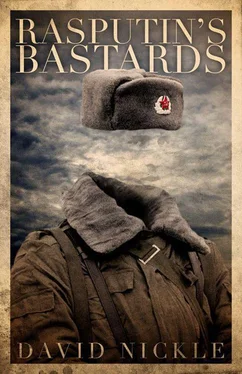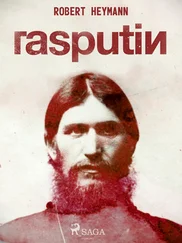Because he was that most dangerous of things: not a bomb, precisely — but for the purposes of Discourse, the great psychic computer that they all lived in, he was something worse.
He was a switch.
If the KGB’d found him, they’d have destroyed him.
Luckily for him, Fyodor Kolyokov had found him first.
He became for Kolyokov an insurance policy. If the other sleepers ever came too close — if they ever decided to attack Kolyokov, reveal him, or just send too many killers after him, he had one way out.
His switch.
As Stephen’s timer counted down, he recalled so many other things. He recalled killing the attaché in New York with a small gun — but for no other reason than Kolyokov needed him out of the way. And he recalled the New Jersey Psychic Fair: the fortune that he’d gotten from Lorelei Jones herself.
“I’m getting a sense that you feel like people use you,” she said.
“Amazing.”
“I’m not getting a sense that you are angry about that though. More—”
“Yes?”
“More grateful. Gratitude? Does that make sense?”
Stephen wasn’t sure that it did. But as he thought about it, he could see how it might. After all, Kolyokov kept him in comfortable living circumstances and didn’t make any sex demands on him. As he thought about it — yeah. Sure.
Stephen nodded.
“I’m getting — a woman,” said Lorelei. “A woman is using you.”
Well no. That wasn’t possible. But Stephen didn’t say anything — just to see where she went.
“All right. Maybe not a woman. Women. You’re a pretty young boy and women like you. But they use you.”
Stephen shook his head. The boldest of rationalization couldn’t carry that. “No women trouble,” he said.
The psychic put her hand on her forehead. “Hmm. It’s cloudy right now. Hard to see. Are you resisting? Because it doesn’t work if you’re resisting.”
“I’m not resisting.”
“Well I’m definitely getting exploitation,” she said. “Maybe not a girl at all.”
Getting warmer, thought Stephen.
“Maybe,” said the psychic, “your father?”
Stephen felt his ass clench shut. He bunched his hands. He looked past her, over to the table behind her, where a little display of cassettes was propped. “How much are those tapes?”
Later, Stephen listened to the three tapes that outlined Lorelei Jones’ Ten Steps to Psychic Oneness. They were comforting in their way. Lorelei had a way of talking that made everything seem all right — and her methodology had a certain dream logic to it that seemed to mirror Fyodor Kolyokov’s methods. At least those few methods he would share with Stephen.
Still, a part of Stephen knew that those tapes were as creaky as Jones’ ham-fisted attempts at psychic readings. They weren’t going to teach him how to dream-walk — they weren’t going to help him take control of the minds of the unwilling and bend them to his own will — they weren’t going to give him access to the real powers that he knew lay just beyond his grasp.
But they hinted at them — they promised them. And Stephen found that promise, that idea of absolute power so compelling that he couldn’t resist.
Then he thought about that power — its true exercise, in lies and deception and cruelty. Was that worth preserving in any way? When people like Babushka and Kolyokov and others exercised it with such evil in their hearts?
One of the clean things about running a giant squid was all that room. Squids had great big brains and high-bandwidth nervous systems. What they didn’t have was a complex mind. There was no need to trick a squid into giving up the controls. No need to cajole the squid into lying to itself. It just welcomed you inside, let you along for the ride, and if you wanted to take the controls — there was no problem.
It was a compelling line of thinking — made no less so than by the fact that it might have been as falsely implanted as a scripted part of his end-game. Scene Twenty-Four: Stephen Haber convinces himself of the rightness of this course, just as the countdown reaches zero.
But ultimately, Stephen thought, the choice was his own to make. He wasn’t a squid. If Fyodor Kolyokov or someone else had put a bomb inside him — the choice was his own.
“Maybe your father?”
The choice was his own.
Stephen Haber’s consciousness, wound tight as a spring for his entire lifetime now, came loose. The light of it was blinding in the consensus metaphor of New Pokrovskoye. The Imperial Palace, built of stones that were quarried by hairy and belligerent dwarves from the provinces of Motavaria, dissolved into dust. The great ramparts surrounding the harbour saturated with the sea and slid and fell and returned to the muck. To the south, the Province of Cloridorme revolted, and when the occupying Imperial Army turned out to be nonexistent, returned to its status as a township in a remote part of Canada with a surfeit of abandoned automobiles. The millions of blinking eyes that saw the empire and moved on its behalf blinked, and fluttered, and extinguished. A million hands reached over to their tape decks and compact disc players and radio stations, and with a huge, simultaneous flick, even the heartfelt rumblings of Ivan Rebroff were ended.
Quiet fell on the land like new snow.
And in the quiet, a baby wailed.
“Shh,” said Alexei. “Hush.”
Vladimir only wailed more loudly as he flailed in the straps of the carriage, the thick madhouse padding of the little blue snowsuit he was in. It was night, and freezing cold — cold enough to make everything brittle. It seemed as though Vladimir’s shrieking would be enough to shatter glass. Alexei rubbed his hands together, and noted ruefully how small they were. He peered across the icy plain in front of him: sure enough, not a quarter-kilometre distant were the low buildings of the Murmansk spy school that never was.
Alexei swore.
He was back. Back at the beginning — enmeshed in the vicious lie that had been his childhood. “This place doesn’t exist,” he said. “Right, Vladimir? All bullshit.”
Vladimir bunched his fists together and turned his wail up a notch.
Alexei turned the carriage around to face him and knelt close to the kid. He met his eye. There was still an intelligence there — the kid knew who he was, there was a spark of that. But only a spark.
“He is spectacular — is he not, my old Comrade?”
Alexei started and turned. Behind him stood an old man in a bathrobe and slippers — his hands jammed into the pockets for warmth. Whips of hair fluttered in the light Barents Sea breeze.
“Kolyokov,” said Alexei.
The old man nodded, and knelt down. He tucked a finger under Vladimir’s chin. “There, there, little petrushka. Do not mourn. Do not cry. Shhh, shh…” He turned to Alexei. “Little Vladimir is losing his mind,” he whispered. “He is losing all the connections with all the people he has met with — losing their memories, the computing power of their brains. Now—” Kolyokov patted Vladimir’s head “—soon, he will just be a baby again. In a sense, he shall be free of them.”
“Kolyokov.” Alexei looked around for a rock — something heavy to bash the old bastard’s brains in.
“Do not bother,” said Kolyokov. “It would not make things any quicker than they are to be anyway.”
“I do not want to make things quicker for you necessarily.”
Vladimir was inconsolable, so Kolyokov sat back in the snow and looked at Alexei. He didn’t say anything, but after a time, he started to smile.
“What?” said Alexei. “What?”
“I am just,” said Kolyokov, “looking at you. Cannot a grandfather admire the children?”
Alexei shook his head, as his mouth half-opened to spit some angry rejoinder. Christ! The old bastard had robbed Alexei of his childhood — of his life, his memory — had coerced him to do terrible things for no cause greater than the persistence of Kolyokov’s great spiderweb. He had sold him out, in a deal with Amar Shadak! To purchase Vladimir and his siblings — like chattel, like slaves!
Читать дальше












